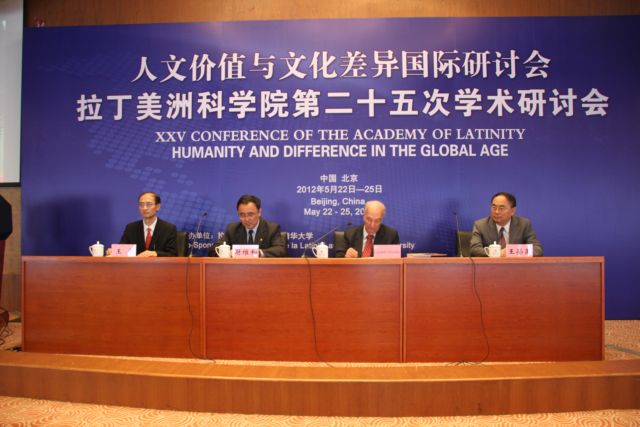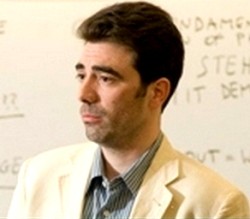 |
Ceasefire magazine, 16 July 2012
Santiago Zabala reports from the Beijing conference of the Academy of Latinity. In a global era when humanity seems to have lost its self-esteem, Zabala writes, the call for a new humanism capable of facing existential annihilation is not only necessary but also urgent.
Beijing, China— For over a decade the Academy of Latinity has been making a unique contribution against philosophical, political, and religious uniformity that no other institution or establishment can match.
Santiago Zabala reports from the Beijing conference of the Academy of Latinity. In a global era when humanity seems to have lost its self-esteem, Zabala writes, the call for a new humanism capable of facing existential annihilation is not only necessary but also urgent.
Beijing, China— For over a decade the Academy of Latinity has been making a unique contribution against philosophical, political, and religious uniformity that no other institution or establishment can match.
The latest conference took place at Beijing Tsinghua University at the end of May to discuss “Humanity and Difference in the Global Age.” The theme and location of the conference were chosen once again by the distinguished Brazilian intellectual Candido Mendes, the creator and promoter of the meeting series.
The conference was attended by academics and students from all over
Asia interested in the profound contributions its participants offered
in this twenty-fifth iteration. The program included talks by Susan
Buck-Morss, Yang Huilin, and many other prominent intellectuals.
Before exploring the conference’s main highlights, we should recall
how this academy was created in 1999 and why it’s so important also for
the dialogue with Islam. The Academy’s aim is to promote conferences and
publications in favour of a new humanism to overcome the cultural,
economical, and linguistic imbalances that result from globalisation’s
unjust distribution of knowledge and information.
Balance, according to the founding members (among others, Carlos
Fuentes, Gabriel García Marquez, Candido Mendes, Edgar Morin, Jose
Saramago, and Gianni Vattimo) can be reestablished through Latinity’s
common unita multiplex, that is, the different interpretations that constitute the participants’ background.
When the members met for the first time in 1999 they established that
the Academy, in order to function independently, had to become a sui
generis institution without governmental support, that is, free of
political constraints. The resources of the Academy come from donations
and subventions granted by international and national institutions
interested in the Academy’s intellectual focus on human dignity as the
basis of freedom and democracy.
In a global era when humanity seems to have lost its self-esteem, the
call for a new humanism capable of facing existential annihilation is
not only necessary but also urgent. For this reason the Academy is
represented by the sign of the pomegranate: a fruit that indicates the
possibility of renovation through its incorporated seeds and also
multiplicity, universality, and, most of all, diversity. As the
executive secretary of the Academy, François L’Yvonnet, points out,
“We are actors of a form of diplomacy of
thought, a diplomacy of open seas that goes to meet the other who is at
the other shore, in a shared refusal of the fatality of an announced
world, that of the exclusive kingdom of the fortunate and the powerful.
The colloquia of the Academy of Latinity are proportionate to this
requirement of the spirit, they give body and life to a true challenge:
that of the difference.”
Such diversity is not only thought at the academy but also practised.
Its meetings (every six months) take place in different cities and with
new participants who share the Academy’s aversion to all sort of
cultural discrimination.
This is why after the unjustifiable terrorist attacks of 9/11 and the West’s violent response, the Academy decided to meet in Alexandria (2004), Amman (2007), and Rabat
(2008) in order to intensify its exchange with Islamic culture. These
conferences (in which Jean Baudrillard, Boutros Boutros-Ghali, and Alain
Touraine also participated) demonstrated how the intellectual exchange
between Latinity and Islam creates the basis for a better understanding
of Islamic heritage and of the opposition common to both Islam and the
West to the imperial politics of fear that always considers the other or
the different an enemy.
At the Beijing conference, the Academy’s “diplomacy of thought,” that
is, the thought and practice of difference, was fully realized. Among
the many themes discussed particular attention was devoted to the way
Chinese intellectuals ought to react to Western cultural imperialism now
that we have entered the so-called Dragon Century.
In order to respond to this question it is first necessary to
acknowledge, as Wang Ning explained, that even though there has been a
strong “Europeanization” or “Westernization” of Chinese culture since
the beginning of the twentieth century through a “large-scale
translation” of foreign texts, China’s is not a culture that can be
“colonized.”
We are dealing here with two completely “different differences.” This
is probably why He Xirong emphasised that we ought to remember the
ontological distinction between Chinese and Western modes of thinking:
while the first emphasises synthesis, induction, and circles, the second
uses analysis, clarity, and linearity.
The Chinese civilisation is made of not only different logics,
ethnics, and languages but also many “multicentric modernities” within
its own boundaries. The geographical differences between Shanghai and
Beijing must also include the profound cultural differences between
them.
In sum, that today there “is an unbalance in China’s cultural and
literary translations” is attributable to the “fact that Chinese people
know much more about the West than Westerners know about China” and also
arises because “Chinese culture is still in a position of marginality.”
At the conference we all agreed that this position must be restored
not because of China’s new economic supremacy but rather in favour of
the new humanism the Academy is committed to constructing.
While some participants, in particular Walter Mignolo, consider
decolonization a fundamental stage of this new humanism, others, such as
Gianni Vattimo, prefer to focus on the hermeneutic nature of (Western)
philosophy in order to better understand the Chinese mode of thinking, a
mode of thinking, as our Chinese colleagues explained, that seeks
“common grounds while keeping differences.”
It is in this spirit of difference that the Academy’s next conference
will take place in Oman, where its pomegranate symbol will once again
seek to renovate humanism once again through its own incorporated seeds.
Santiago Zabala is ICREA Research Professor of Philosophy at the University of Barcelona. He is the author of The Hermeneutic Nature of Analytic Philosophy (2008), The Remains of Being (2009), Hermeneutic Communism (2011, coauthored with G. Vattimo), editor of Weakening Philosophy (2007), The Future of Religion (2005), Nihilism and Emancipation (2004), Art's Claim to Truth (2009), and co-editor with Jeff Malpas of Consequences of Hermeneutics (2010). Zabala also writes opinion articles and reviews for the New York Times, Al Jazeera, El Pais and other international journals.
Santiago Zabala is ICREA Research Professor of Philosophy at the University of Barcelona. He is the author of The Hermeneutic Nature of Analytic Philosophy (2008), The Remains of Being (2009), Hermeneutic Communism (2011, coauthored with G. Vattimo), editor of Weakening Philosophy (2007), The Future of Religion (2005), Nihilism and Emancipation (2004), Art's Claim to Truth (2009), and co-editor with Jeff Malpas of Consequences of Hermeneutics (2010). Zabala also writes opinion articles and reviews for the New York Times, Al Jazeera, El Pais and other international journals.




Nessun commento:
Posta un commento